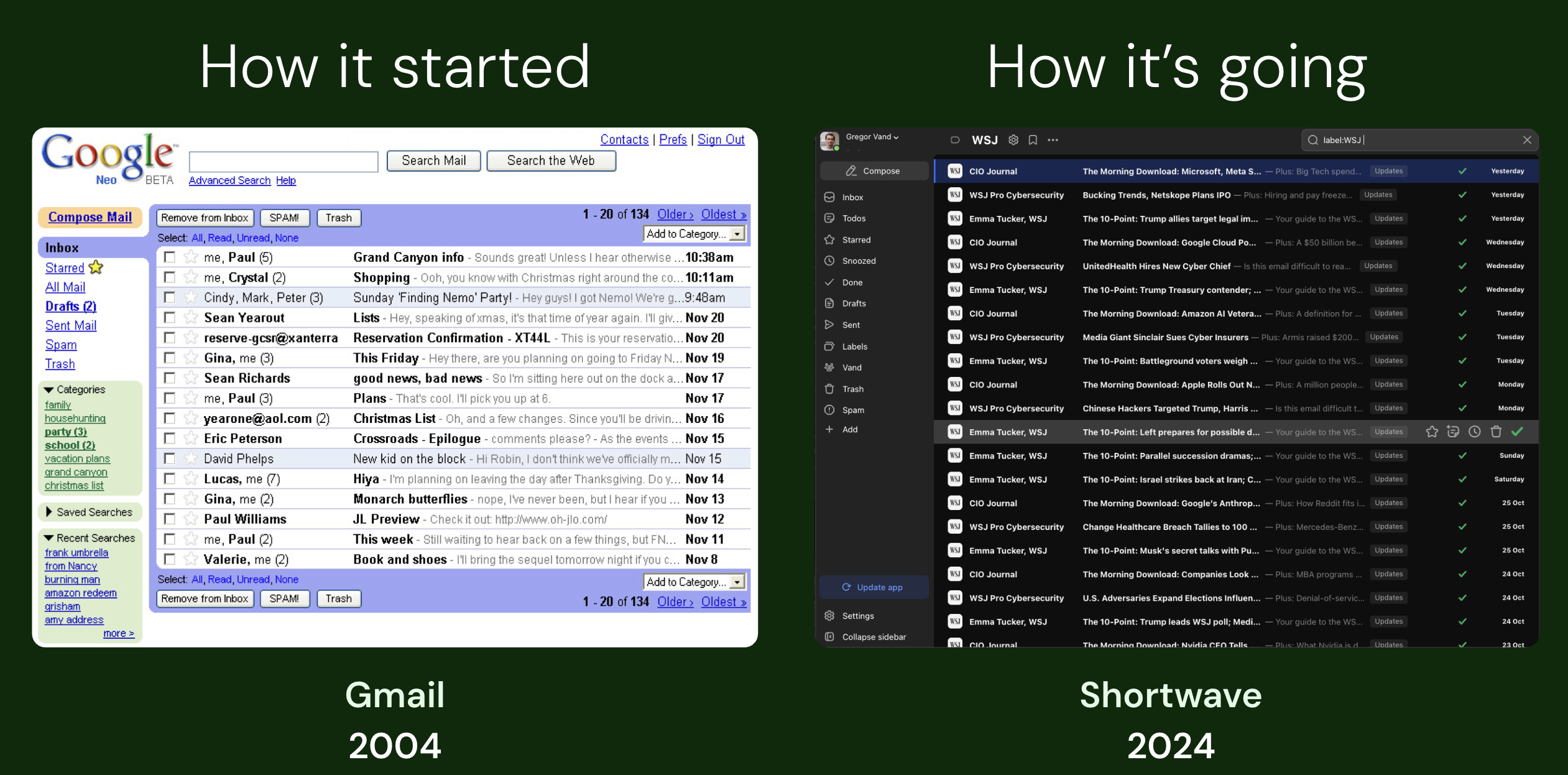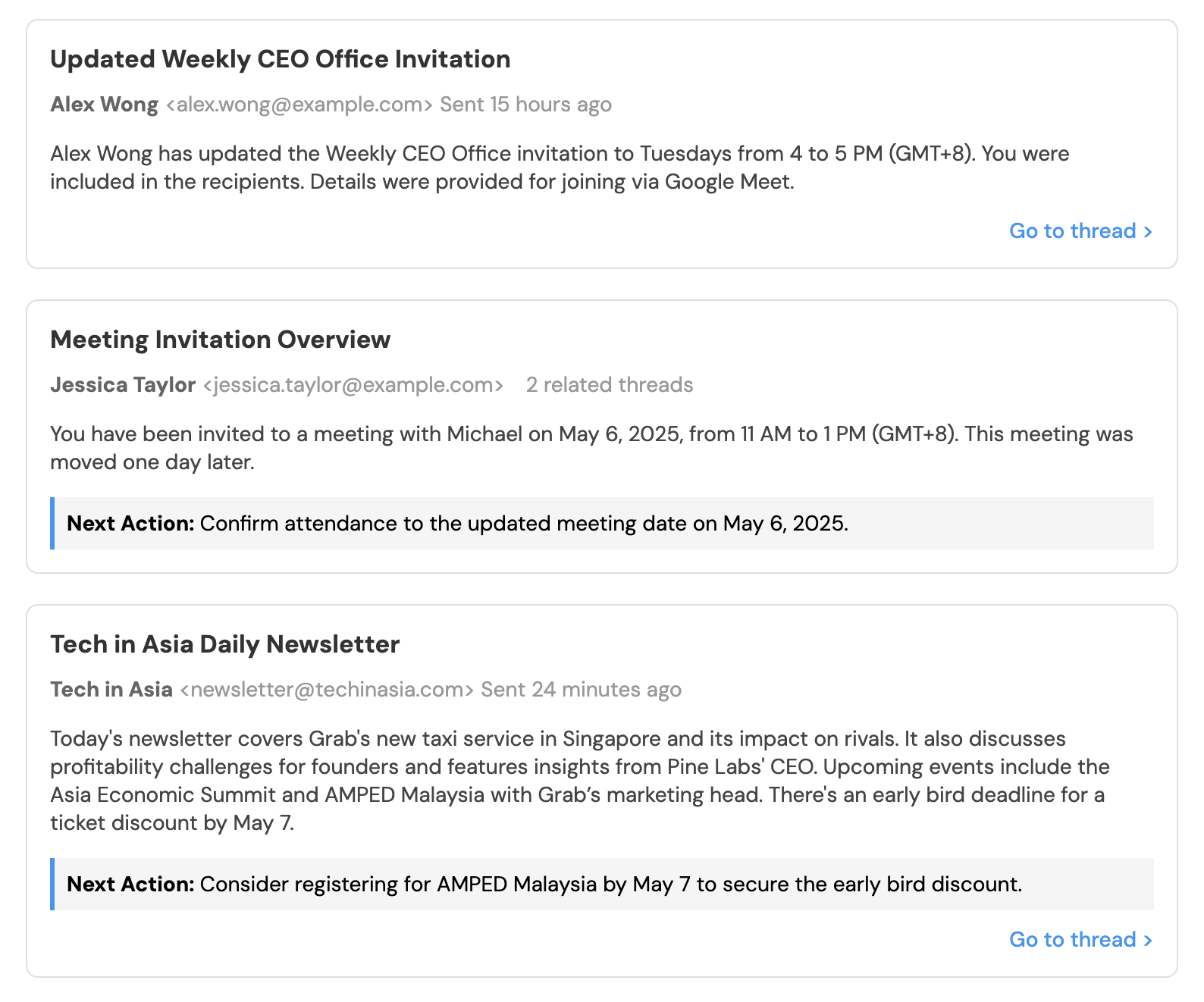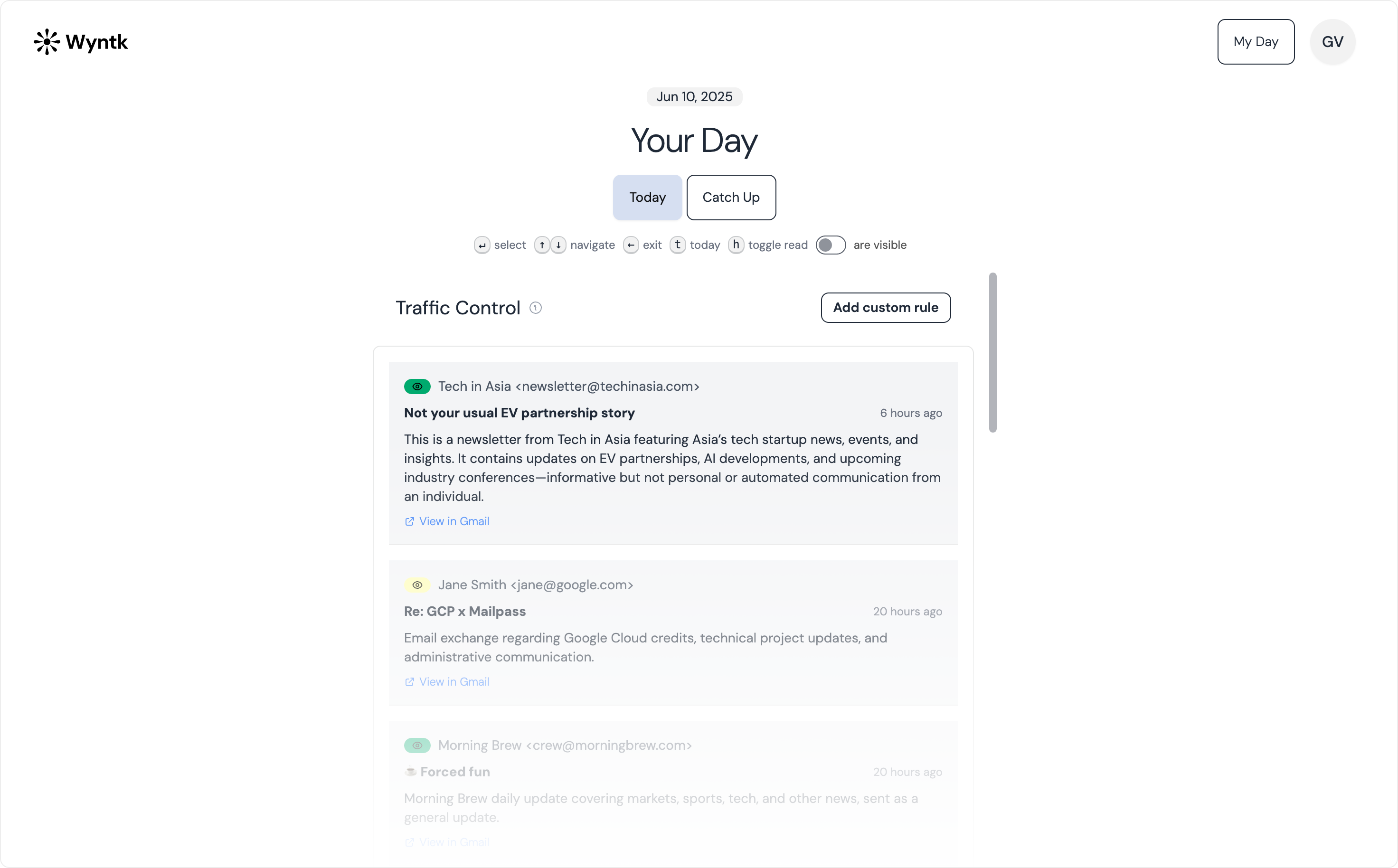What You Need To Know
Most people think email is broken. They're wrong—but they're not crazy for thinking it. Gmail is basically a database with a user interface designed by database people: rows, columns, basic sorting. It works fine for storing messages. It's terrible for making decisions about what matters.
So we've defaulted to treating every message the same. Gym membership renewals get the same mental priority as notes from our biggest client. This is insane.

(We don't mean to throw shade at Shortwave, but this does help illustrate the point).
The Real Problem
Here's what actually happens when you check email: you scan subject lines that tell you nothing, decode sender names you don't recognize, and try to remember if "noreply@updates-platform-business.com" is legitimate or spam. You've trained yourself to treat every message as equally urgent by default.
The productivity gurus tell you to get to "inbox zero." At what cost? Tools like Superhuman help you process faster .. great, now you can reach that empty inbox in half the time. Tomorrow morning you're back to square one.
The conventional wisdom is better filters, better folders, better rules. This is like saying the solution to traffic is more lanes. It misses the fundamental issue: we're processing information that varies wildly in importance using tools designed for uniform processing.
What we need is triage. Real triage, not the fake kind where you star things and hope you remember later. We need systems that understand context—that know the difference between a calendar reminder and a contract negotiation.
Two Modes of Email
This is why I'm excited about what we've been building at Wyntk. We started from a simple premise: most of your email doesn't matter, and the stuff that does matter should be obvious. Instead of trying to organize everything, we're trying to surface what's actually important.
The name says it all - What You Need To Know. Not what you might want to know, not what someone else thinks you should know, but what you actually need to know to do your job and live your life.
The core insight is that email has two distinct modes that we've been conflating. There's processing mode, where you're trying to get through everything, and there's action mode, where you're trying to focus on what matters. Most email clients optimize for processing—they show you everything in chronological order and let you sort it out. Wyntk optimizes for action.
Their daily digest is particularly fun. Instead of checking email throughout the day, you get one summary in the morning that tells you what actually needs your attention. It's like having a really good assistant who reads everything and only bothers you with the important stuff. The difference is that this assistant never gets tired, never misses context, and learns what's important to you specifically.

A recent breakthrough is in how we're handling the international problem - something our team has acute experience with, working across geographies and timezones in past roles. If you work with people across time zones, you know the pain of waking up to hundreds of messages, most of which are just people in other time zones having conversations that don't involve you. Wyntk's overnight triage feature solves this by automatically identifying what actually requires your attention from overnight communications. You can optionally 'catch up' back to 7 days using the same triage process. Particularly helpful after a long flight, a 2-day conference, or a vacation.
True story - I was in an airport recently on a layover. A professional told their colleague that based on the amount of travel they do, they always have 2 days worth of emails to catch up on. So they often take a secret 'day off' because they feel they've been doing double work the rest of the week. That's an unfortunate take on the 4-day workweek.
We've learned the hard way to not try to change human behaviour. We're not asking you to adopt some new methodology or learn a complex system. It's just making the system you already use work better.
I believe we are onto something important here. Email isn't going away - it's too ubiquitous, too universal, too embedded in how we work, especially with external parties (that 'shared' Slack channel with your client seemed like a great idea at the time, but..).
Most productivity tools fail because they require you to change your habits. The successful ones work with your existing habits and just make them more effective. Wyntk is continually evolving within the second category.
The early users seem to get it. One user in the creative industry working across timezones said they'd be "certified disappointed" if Wyntk went away tomorrow. Another user in VC mentioned that it helps them remember to reply to emails they read at night but forgot about by morning just because it was now in the 'read' state. These aren't dramatic testimonials about life-changing transformations. They're quiet acknowledgments that something is working better than it used to.
That's usually how the best tools feel. Not revolutionary, just obviously better. Like someone finally fixed something that was broken, even if you didn't realize it was broken until it got fixed.
 Wyntk alpha, actual experience
Wyntk alpha, actual experience
Email Is Too Important to Break
We are of course being thoughtful about the rollout. We are in limited alpha, opening access systematically rather than trying to scale as fast as possible. Email is too important to break, and trust is too hard to rebuild once you've lost it.
A quick technical sidebar for those interested - we don't keep copies of your emails - we process what we need to provide the service, then discard it that temporary information. We've also gone through the CASA Tier 2 security audit, which any app that accesses any Google service must pass before becoming available to the public. We passed that with flying colours.
Currently, our pricing is four dollars a month for personal Gmail accounts, eleven for Google Workspace. AI-backed products should not price people out from day one. The exact advantage of using and AI-first approach to our build and choices is being able to deliver this product at a cost that is in reach of most knowledge workers, as opposed to a luxury product for executives where many of our competitors have positioned themselves.
Working With What Exists
We're obviously not alone in this space, and I suspect we're going to see even more tools like this—tools that work with existing systems rather than trying to replace them, tools that use AI to surface signal rather than just generate more noise, tools that respect the fact that most people don't want to learn new workflows, they just want their current workflows to work better.
The future of productivity software isn't about building new platforms. It's about making the platforms we already use more intelligent. Wyntk is an early example of what that looks like for email.
Email doesn't need to be fixed. It needs to be understood. And understanding, it turns out, is exactly what AI can provide when you build from first principles.
Hit 'Join waitlist' above to get early access and experience how email can be. We're onboarding new users every week.